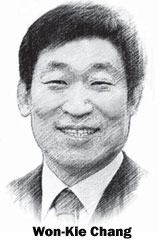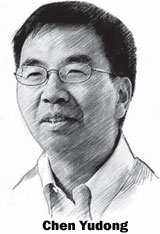|
 |
|
|
Editor's note: What the Chinese call the "two sessions," meaning the annual sessions of the National People's Congress, the top legislature, and the Chinese People's Political Consultative Conference National Committee, the top political advisory body, are not just China's own business.And this year's two sessions are of particular importance because they will witness the lineup of a new government and a new cabinet, which will in turn guide and serve China's economic reform and development in the next five years as it has become the second-largest economic power and perhaps the largest trading country in the world. Officials have said at the two sessions that China will make better efforts at reform and tap the vast potential of the country's 1.35 billion consumers. So, to a great extent, the leadership team and the development program to soon arise from Beijing will be internationally significant and affect many companies around the world, especially those that are already holding large business interests in China. We asked five executives from global businesses operating in China to share their opinions and ideas. What are their expectat ions and what are their concerns - now that both the country and the world are quite a way from the time when they just expanded into the newly opening-up China market in the 1990s?
 |
|
|
No matter whether international or local retailers expand in the business, the major challenges are product quality, service and supply chain integration, providing good-quality products at low prices, and driving forward the development of the business.
----- Thierry Garnier |
|
|
The second major topic is the environment. I observed many delegates' proposals focusing on "a beautiful homeland". The third one is urbanization. Recently, the Chinese media have begun to review past urbanization patterns. How to drive China's urbanization, promote orderly population mobility and guide a new way of life are all issues that need discussion.
But the government also should take measures to improve people's livelihoods and increase their purchasing power, which will help boost domestic demand. ----- Won-Kie Chang |
|
|
The most pressing challenges China faces today include environmental pollution, clean and safe energy supply, adequate healthcare and food security. A key question is how the nation can continue to grow economically in a profitable yet sustainable way, as well as to rebalance the economy. The new Chinese leadership stressed that in response to changes in both domestic and international economic developments, China should speed up the creation of a new growth model and ensure that development is based on improved quality and performance. A new target for economic growth has been set as doubling 2010 GDP and people's incomes by 2020. The new leadership also stressed the need for sustainable development with a focus on innovation and environmental protection. We are very confident about China's future economic development in a sustainable and steady manner. The Chinese government has clearly stated that it will focus on quality growth during the 12th Five-Year Plan, and has set clear targets for agriculture, healthcare and energy efficiency.
We would wish to strengthen the enforcement of IPR laws and measures to encourage innovation.
b: As global experts in healthcare, crop protection and high-tech materials, we would wish to be involved even more actively during the drawing up of industrial policies and in R&D projects; c: Strengthen enforcement of IPR laws and measures to encourage innovation; d: Bayer will continuously strengthen its role as a leader in corporate citizenship, by contributing to sustainable development in China through innovative solutions and initiatives. These include high-quality products, advanced technical standards and our cooperation with government, social groups and leading academic institutes. ----- Johannes M. Dietsch |
|
|
Over the past 10 years, China has made tremendous achievements in economic growth and social development. We have seen a clear trend that the country will focus more on a faster shift away from the "export- and investment-driven" growth model to a more balanced approach, including a major focus on driving domestic consumption. We are also glad to see that China will put more emphasis on living standards - health care, education, rural development, social insurance and environmental protection - and will attach great importance to food safety. As a leading beverage company, Coca-Cola is committed to upholding the highest safety standards and providing world-class products to the Chinese market.

As China continues to strengthen its innovation capabilities, optimize and upgrade its industries, and transform the country's economic growth pattern, we are confident that the country will be on the right track for sustainable growth.
Today, China represents Coca-Cola's third-largest market in the world, and we see tremendous growth opportunities and are looking to ensure we can continue to provide the best products to our customers here. Overall, we believe it has become easier to do business in China as the country has integrated with the world economy. We expect better transparency in laws and regulations and more flexibility in choosing business structures and partners, placing more requirements on companies but also creating a more predictable business environment.
Coca-Cola has always been honored to be part of this great nation's business, cultural and social landscape. We hope the country will continue to encourage efforts to speed up its globalization process, which will benefit all Chinese people. In every market where Coca-Cola operates, including China, we are committed to investing locally, producing locally, hiring locally and acting responsibly in the communities where our businesses are located. One challenge we at Coca-Cola are helping to address is that of growing the economy in a sustainable and environment-friendly way. We believe that embedding sustainability into our strategy, operations and investment plans is part of our mission to inspire moments of optimism and happiness, and create value and make a difference to everyone we touch. Hence we also welcome the opportunity to work with the Chinese government to explore policy options to encourage innovation investments. ----- David G. Brooks |
|
|
China has witnessed 30 years of rapid development. Such rocketing growth is a miracle in the global history of economic development and can hardly be repeated in the future. Sustainable and steady development will be the next focus for China. Meanwhile, another important issue is to share with the people the benefits of economic development and improved livelihoods.
With rapid development after opening-up and reform for 30 years, China's economic development will switch to a moderate pace. Nowadays, as some costs, for example labor and raw materials, increase, maintaining business output will require productivity efficiency. In the past, environmental destruction and energy shortages are the price we paid for economic development. Now, air pollution in major cities like Beijing is a sign of the problems that industrial development brings. Energy not only drives machines, but also powers a country's progress. Exploration of renewable energy resources and maximizing the utility rate of fossil fuels would be the ideal solutions.
This is no easy task. Meanwhile, given rising labor costs, improving productivity and maintaining profitability will also become a challenge.
However, beyond control itself, we hope regulations and laws can be strictly implemented and monitored. We also hope the new leadership will consider an incentive program for diesel cars to help reduce energy consumption. ----- Chen Yudong |























